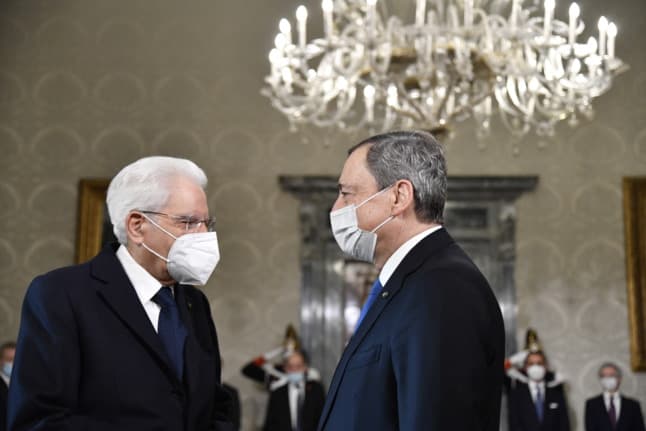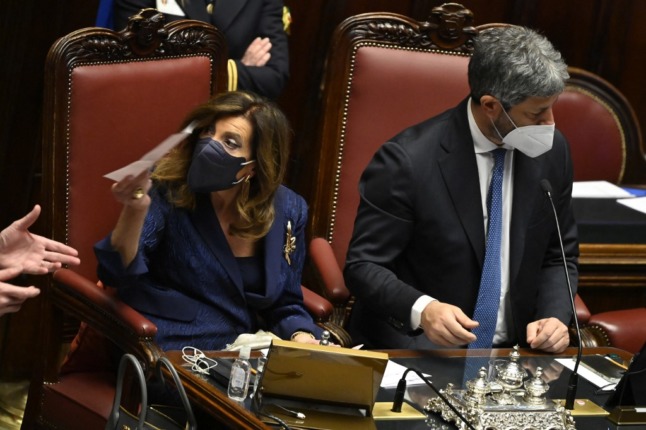Italy begins holding two votes a day as presidential deadlock continues

Italian political leaders agreed on Friday to hold two daily votes for the post of president after days of deadlock that has paralysed Prime Minister Mario Draghi's government.
Four rounds of voting in parliament since Monday have failed to produce anything close to a winner, with most lawmakers casting blank ballots or abstaining due to a lack of agreement between the parties.
Four rounds of voting since Monday failed to produce anything close to a winner, with most lawmakers casting blank ballots or abstaining due to a lack of agreement between the parties.
The change followed calls to step up the pace from Enrico Letta of the centre-left Democratic Party and Matteo Salvini of the populist, anti-immigration League party.
However, the vote can still go on indefinitely as long as parties fail to find a consensus.
But the first ballot on Friday resulted in failure, after the leftist bloc in parliament abstained in protest at the candidate proposed by the right.
And the sixth attempt in the evening collapsed before it started after the right-wing bloc said it would abstain in response to the earlier boycott.
Two more votes were scheduled Saturday, and negotiations continued between the disparate parties that share power in Draghi's national unity government.
EXPLAINED: Do Italian presidential elections normally take this long?
The presidential vote - which with its secret ballots and back-room deals is often compared to a papal conclave - risks deepening fractures within the current broad coalition government that has been in place for 11 months.
On Friday, the right-wing bloc in parliament, including Matteo Salvini's League party and Silvio Berlusconi's Forza Italia, finally put forward a candidate, Senate president Elisabetta Casellati.
But as a Berlusconi loyalist known for her opposition to abortion and same-sex unions, she is controversial and unlikely to secure the required majority of votes.
Former premier Berlusconi, who abandoned his own unlikely candidacy at the weekend but has since been in hospital, ostensibly for checks, vouched for her "absolute suitability".
"I appeal to parliamentarians on all sides to ask them to support Casellati," the 85-year-old said in a statement.

President of the Senate Maria Elisabetta Alberti Casellati (L) is one of the people in charge of counting ballots, but is now herself in the running to become Italy's new president. Photo: Alberto PIZZOLI / POOL / AFP)
But the so-called centre-left bloc, including the Democratic Party and the populist Five Star Movement, decried a "serious error" of choice and boycotted the morning vote.
"The solution is an impartial name we all agree on," Five Star leader and former premier Giuseppe Conte told reporters.
PM Draghi, a former European Central Bank chief brought in to lead a national unity government almost a year ago, remains in the running to be elected new head of state.
But there is widespread concern his departure as prime minister could destabilise the government at a critical time and even spark snap elections - which few parties want.
READ ALSO: Five things to know about Italy’s presidential elections
But "as the stalemate continues and the political backdrop becomes more toxic, the main beneficiary could end up being either Mario Draghi or (outgoing) President Sergio Mattarella", noted Wolfango Piccoli of the Teneo consultancy.
Mattarella, 80, secured the largest number of votes in Thursday's round of voting, despite repeatedly saying he will not renew his seven-year term.
Italy has recovered strongly from a 2020 pandemic-induced recession but is banking on almost 200 billion euros in EU funds to cement the trend.
This money is in turn dependent on a tight timetable of reforms - notably to the tax and justice systems, and public administration - that many fear will be derailed without Draghi's hand on the tiller.
The president is a ceremonial figure but wields great power during political crises - frequent events in Italy, which has had dozens of different governments since World War II.
The vote for the presidency is carried out in parliament among more than 1,000 MPs, senators and regional representatives.
Comments
See Also
Four rounds of voting in parliament since Monday have failed to produce anything close to a winner, with most lawmakers casting blank ballots or abstaining due to a lack of agreement between the parties.
Four rounds of voting since Monday failed to produce anything close to a winner, with most lawmakers casting blank ballots or abstaining due to a lack of agreement between the parties.
The change followed calls to step up the pace from Enrico Letta of the centre-left Democratic Party and Matteo Salvini of the populist, anti-immigration League party.
However, the vote can still go on indefinitely as long as parties fail to find a consensus.
But the first ballot on Friday resulted in failure, after the leftist bloc in parliament abstained in protest at the candidate proposed by the right.
And the sixth attempt in the evening collapsed before it started after the right-wing bloc said it would abstain in response to the earlier boycott.
Two more votes were scheduled Saturday, and negotiations continued between the disparate parties that share power in Draghi's national unity government.
EXPLAINED: Do Italian presidential elections normally take this long?
The presidential vote - which with its secret ballots and back-room deals is often compared to a papal conclave - risks deepening fractures within the current broad coalition government that has been in place for 11 months.
On Friday, the right-wing bloc in parliament, including Matteo Salvini's League party and Silvio Berlusconi's Forza Italia, finally put forward a candidate, Senate president Elisabetta Casellati.
But as a Berlusconi loyalist known for her opposition to abortion and same-sex unions, she is controversial and unlikely to secure the required majority of votes.
Former premier Berlusconi, who abandoned his own unlikely candidacy at the weekend but has since been in hospital, ostensibly for checks, vouched for her "absolute suitability".
"I appeal to parliamentarians on all sides to ask them to support Casellati," the 85-year-old said in a statement.

But the so-called centre-left bloc, including the Democratic Party and the populist Five Star Movement, decried a "serious error" of choice and boycotted the morning vote.
"The solution is an impartial name we all agree on," Five Star leader and former premier Giuseppe Conte told reporters.
PM Draghi, a former European Central Bank chief brought in to lead a national unity government almost a year ago, remains in the running to be elected new head of state.
But there is widespread concern his departure as prime minister could destabilise the government at a critical time and even spark snap elections - which few parties want.
READ ALSO: Five things to know about Italy’s presidential elections
But "as the stalemate continues and the political backdrop becomes more toxic, the main beneficiary could end up being either Mario Draghi or (outgoing) President Sergio Mattarella", noted Wolfango Piccoli of the Teneo consultancy.
Mattarella, 80, secured the largest number of votes in Thursday's round of voting, despite repeatedly saying he will not renew his seven-year term.
Italy has recovered strongly from a 2020 pandemic-induced recession but is banking on almost 200 billion euros in EU funds to cement the trend.
This money is in turn dependent on a tight timetable of reforms - notably to the tax and justice systems, and public administration - that many fear will be derailed without Draghi's hand on the tiller.
The president is a ceremonial figure but wields great power during political crises - frequent events in Italy, which has had dozens of different governments since World War II.
The vote for the presidency is carried out in parliament among more than 1,000 MPs, senators and regional representatives.
Join the conversation in our comments section below. Share your own views and experience and if you have a question or suggestion for our journalists then email us at [email protected].
Please keep comments civil, constructive and on topic – and make sure to read our terms of use before getting involved.
Please log in here to leave a comment.